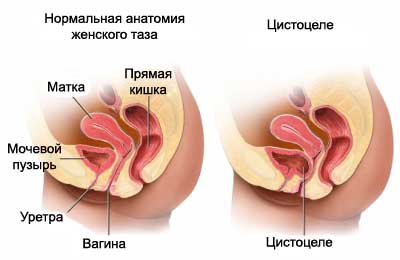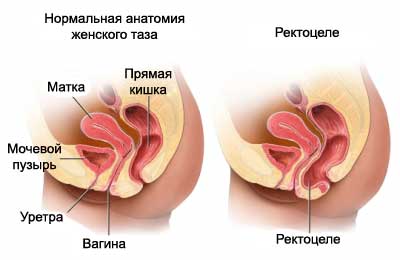Treatment of cystocele and rectocele
Description cystocele and rectocele
Cistocele and rectocele formed due to problems with the tissues in the pelvis (disorders fascias, ligaments or muscles).
Cystocele occurs, when a part of the bladder wall bulges into the vagina. Flexing arises due to a defect in the tissue between the bladder and vagina.

Rectocele there, when part of the wall of the rectum bulges into the vagina. Flexing arises due to a defect in the tissue between the rectum and vagina.

The reasons for the treatment of cystocele and rectocele
Treatment is performed, to stop the symptoms, such as problems going to the toilet, urine leakage, or pain during sex. Most often, this type of operation is performed, not yet been tried other treatments.
Other treatments may include exercises to strengthen the muscles and inserting pessaries (pessary) – devices, placed in the vagina, to try to insert the bladder or rectum back into place. If after these procedures do not come relief, your doctor may suggest surgery.
Possible complications in the treatment of cystocele and rectocele
Complications are rare, but no procedure does not guarantee the absence of risk. Before, how to perform the operation, you need to know about possible complications, which may include:
- Adverse reaction to anesthesia;
- Infection;
- Bleeding;
- Accidental damage to vagina, rectum and bladder;
- Accidental damage to nearby organs;
Factors, that may increase the risk of complications:
- Smoking.
How is the treatment of cystocele and rectocele?
Preparation for the procedure
- You may be asked to stop taking some medicines:
- Anti-inflammatory drugs (eg, aspirin);
- Blood thinners, such as clopidogrel, warfarin;
- In the evening before surgery you can eat a light meal. You can not eat or drink anything after midnight on the day of the procedure;
- If surgery is performed to remove rectocele, You may need an enema the night before surgery.
Anesthesia
At step used general or local anesthesia. With general anesthesia, you will sleep. Local anesthesia numb your lower body, but the patient is conscious.
Procedure to eliminate cystocele and rectocele
The catheter is inserted into the bladder to the urethra, to reduce the pressure on the bladder.
It will make an incision in the skin, at the location of abnormal (dispersed) muscle tissue. In some cases, the muscles and the tissue sutured, it strengthens them. In other cases, you will use the material type of the grid, to strengthen the fabric bulges. Cloth, which has been weakened by previous operations, pregnancy will be removed. Excess vaginal cover will be removed.
In some cases, surgery may be, to provide additional support to the bladder.
How long will the surgery?
From 45 minutes to two hours or more.
Eliminating cystocele and rectocele – Will it hurt?
Vaginal discomfort may be felt for 1-2 weeks after surgery. Doctor prescribes pain medication.
The average hospital stay
Usually the duration of stay of 1-2 day. The doctor can extend the period of stay, If there are complications.
Care of the patient after treatment cystocele and rectocele
Care in a hospital
- In the vagina at night usually leave a special vaginal swab;
- If you were treated rectocele, bladder catheter will be removed, once you are in a position to go to the toilet. In the treatment of cystocele bladder catheter often have to leave for a long time (sometimes 2-6 days). This allows the bladder time, to begin to function normally;
- Sometimes you may notice foul-smelling, or bloody vaginal discharge for 1-2 weeks.
Home Care
When you return home, Follow these steps:, to ensure the normal recovery:
- Avoid lifting objects more 5 kg for about six weeks;
- Avoid sexual intercourse for about six weeks,;
- Do not insert into the vagina (eg, tampons) for about six weeks;
- Ask someone to help you at home for a few days after the operation;
- Drink plenty of fluids and eat a healthy diet high in fiber;
- We need to ask your doctor about, when it is safe to shower, bathe, or to expose the surgical site to water;
- Be sure to follow your doctor's instructions.
Contact your doctor after treatment cystocele and rectocele
After discharge from the hospital need to see a doctor, If the following symptoms:
- Signs of infection, including fever and chills;
- Excessive bleeding or discharge from the incision foreign;
- Heavy vaginal bleeding, or bad-smelling discharge from the vagina;
- Nausea and vomiting;
- Pain, which does not pass after taking pain medication appointed;
- Inability to urinate through a catheter;
- Pain, burning, frequent urination or persistent blood in the urine;
- Cough, shortness of breath or chest pain.
